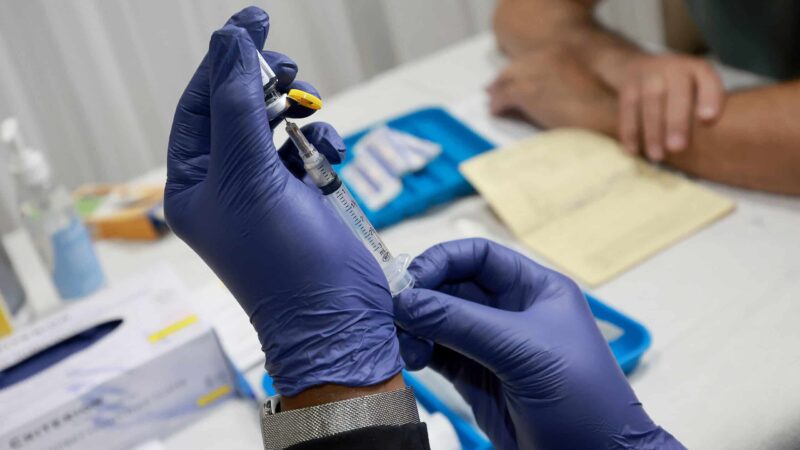Local health officials plan to increase monkeypox vaccinations
A healthcare worker prepares to administer a vaccine to a person for the prevention of monkeypox the Pride Center on July 12, 2022 in Wilton Manors, Florida.
The Jefferson County Department of Health (JCDH) is beginning to “scale up” its immunization efforts against monkeypox, thanks to new guidance from the U.S. Food and Drug Administration (FDA).
By next week, the county said it will begin offering intradermal injections of the Jynneos vaccine, a method that was granted emergency use authorization Wednesday by the FDA.
“Instead of putting it deep under the skin into the fat, it really goes fairly shallow into the skin,” said Dr. Wesley Willeford, medical director of disease control at JCDH. “(The method) seems to provide a very good immune response based on some of the data that was submitted when the Jynneos vaccine was initially approved,” Willeford said.
The change allows providers to stretch their vaccine supply five-fold, a critical need for health departments across the country that do not have enough doses to meet demand.
“We have a lot of people looking to get the vaccine,” Willeford said. “The big rate limiting step that really was holding us back was the number of vaccines that Alabama and thus JCDH has received so far.”
Willeford said JCDH has obtained about 150 doses of the Jynneos vaccine as of Thursday.
That’s out of a state allotment of 1,271 doses, according to Dr. Karen Landers, chief medical officer with the Alabama Department of Public Health (ADPH).
“We don’t have a lot of vaccine,” Landers said, “but we’re trying all we can to first of all, address the need, but secondly, ensure that we have equity among our rural counties as well as our urban population centers.”
Landers said doses have been distributed to health departments in Mobile and Jefferson counties, along with other locations across the state.
She said ADPH supports moving to intradermal vaccination to immunize more people, but the department needs to review available data and ensure that medical providers can implement the change.
“Some clinics might be able to make a more rapid shift than others,” she said. “But we have to make sure that people have training to do intradermal because it’s not something that younger health care providers have much experience (with).”
As of Friday morning, 27 cases of monkeypox have been reported in Alabama. Health officials have not disclosed the location of those cases, citing privacy concerns, but Landers said the virus is spreading “throughout the state.”
Dr. Michael Saag, infectious disease specialist at the University of Alabama at Birmingham, said the state’s response to the virus is “in flux” but “headed in the right direction.”
He said testing capabilities have increased in recent weeks, but it’s “pretty likely” that many cases have not yet been diagnosed.
“That’s what has everybody a little concerned,” Saag said. “Because that smoldering of transmission that might be occurring in the community is going to create more of a bump in cases once we get diagnostics up and running in a more robust way.”
Saag said the virus is mostly spreading through close skin-to-skin contact, usually via sexual exposure. Most cases have been identified among men who have sex with men, but the virus is not a sexually transmitted disease and can infect anyone who is exposed to it.
“This virus doesn’t care whether you’re gay or straight or what type of sexual practice you have,” Saag said. “It’s just a question of what populations are hit. And right now, it appears that the overwhelming number of cases in the United States in particular, are among men who have sex with men.”
He said the priority is to vaccinate people who fall in those high risk groups, specifically targeting people who know they have been exposed to the virus, which has a 10 to 14 day incubation period.
“If you give the vaccine, say on day four, you can stop the expression of symptoms,” Saag said. “So we have that window.”
State and local health officials said they are working on plans to better educate the public about monkeypox prevention and early detection.
They said testing is now widely available at routine medical clinics, typically with a 24 to 48 hour turnaround time for results.
Vaccination is currently only offered at county health departments and prioritized for people who know they have been exposed to monkeypox, those who work with the virus in laboratory settings and those who fall into high risk categories.
Officials with ADPH said they are still collecting data and do not know how many people have been vaccinated statewide. As of Thursday, officials with JCDH said they had distributed 70 doses.
To inquire about obtaining a monkeypox vaccine in Jefferson County, call 205-933-9110.
Auburn fires coach Hugh Freeze following 12th loss in his last 15 SEC games
The 56-year-old Freeze failed to fix Auburn’s offensive issues in three years on the Plains, scoring 24 or fewer points in 17 of his 22 league games. He also ended up on the wrong end of too many close matchups, including twice this season thanks partly to questionable calls.
In a ‘disheartening’ era, the nation’s former top mining regulator speaks out
Joe Pizarchik, who led the federal Office of Surface Mining Reclamation and Enforcement from 2009 to 2017, says Alabama’s move in the wake of a fatal 2024 home explosion increases risks to residents living atop “gassy” coal mines.
‘It’s like feeling the arms of your creator just wrapped around you’: a visit to a special healing Shabbat
Members of Temple Emanu-El in Birmingham gathered recently for their traditional Friday Shabbat service. But this particular service was different, as could be seen by all the people dressed in their finest pink.
Space Command is coming to Huntsville. What might that mean for first-time homebuyers
While Huntsville has been a more affordable market than other growing cities, what’s it been like for those looking for their first home?
Colorado says relocation of Space Command to Alabama is ‘punishment’ for mail-in voting
The litigation announced by Colorado Attorney General Phil Weiser asks a federal judge to block the move as unconstitutional.
Breaking down Alabama’s CHOOSE Act
It’s been a year since Alabama legislators passed the CHOOSE Act allowing families to apply for state funds to use towards homeschool expenses and tuition for participating private schools. The Alabama Daily News’ education reporter Trisha Powell Crain has been diving into how the funds are being used. WBHM’s Andrew Gelderman sat down with her to talk about what we’re seeing so far.









